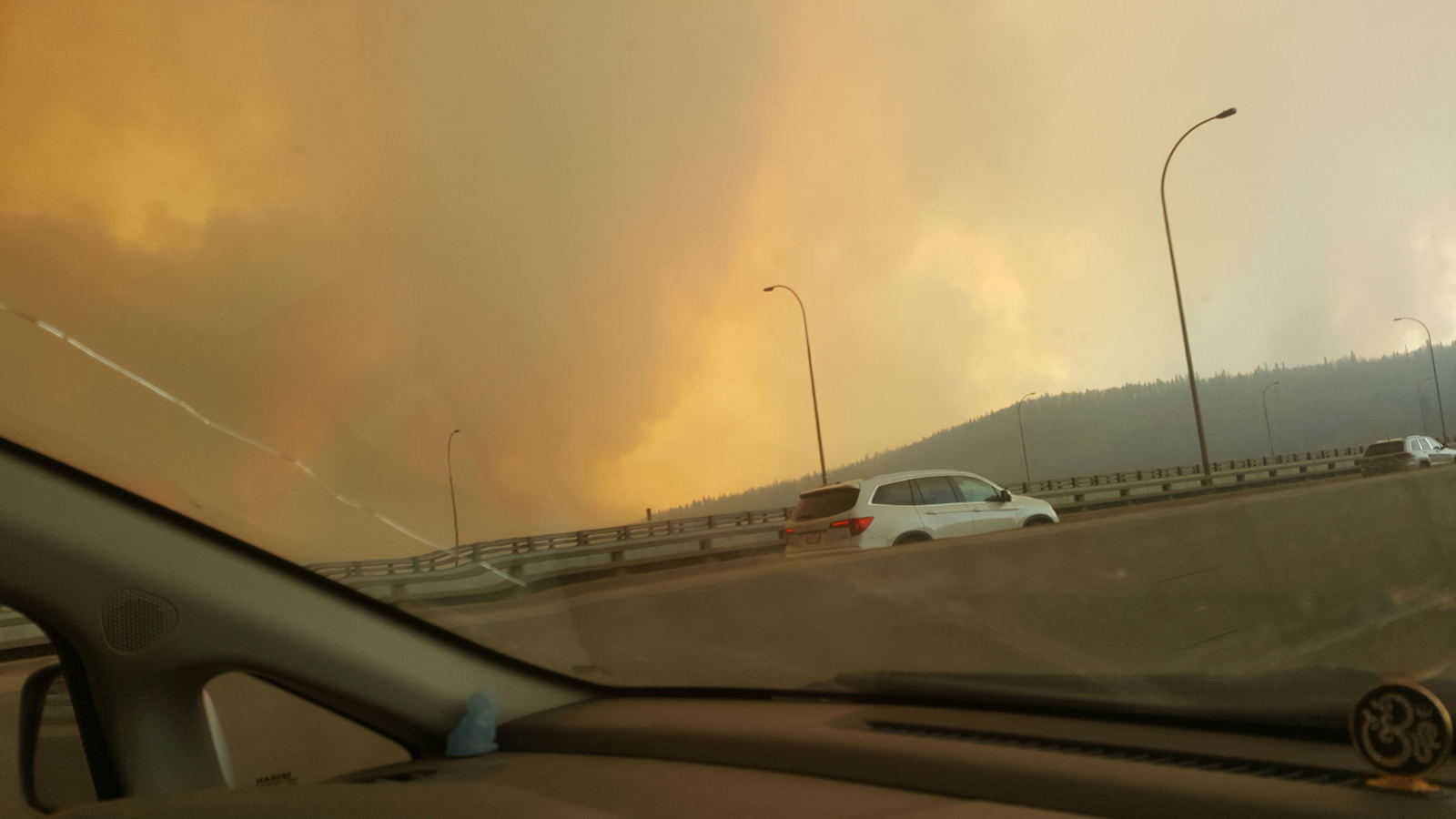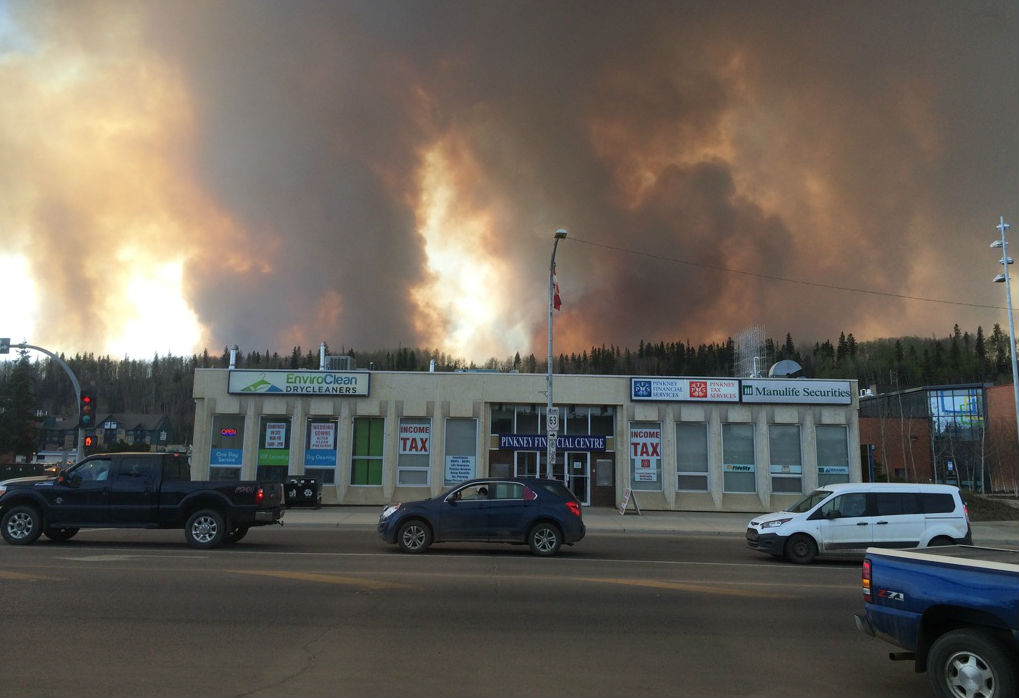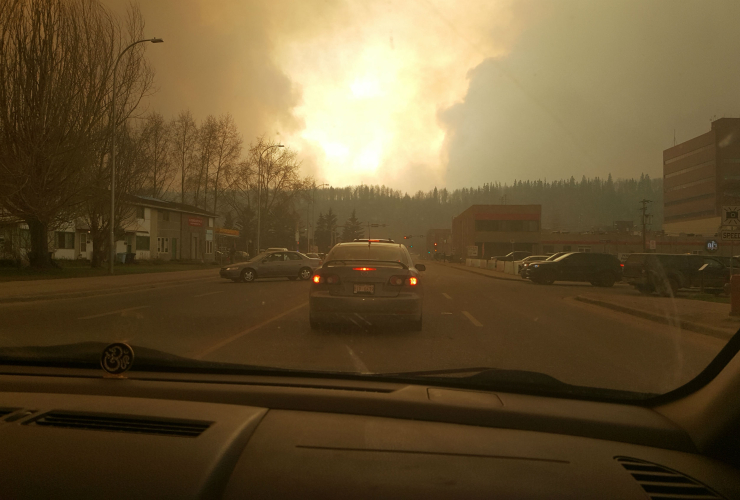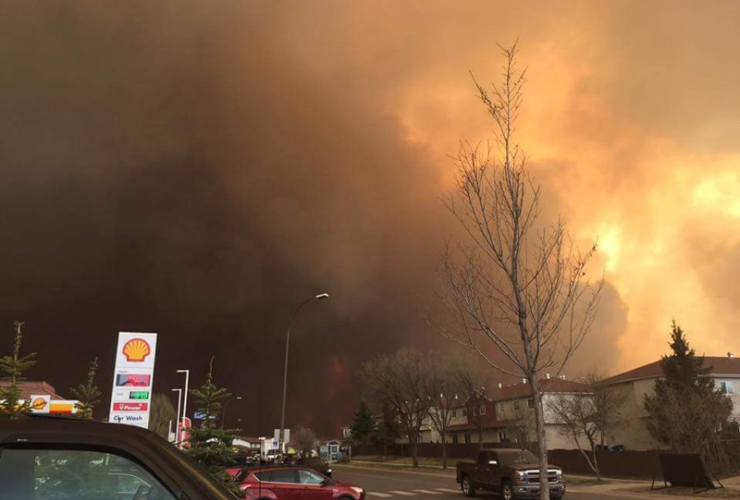Nearly 90,000 people have been evacuated as firefighters douse a vicious blaze in the northern Alberta city of Fort McMurray. The province has declared a state of emergency, and warned all the city's residents not to attempt a journey back home.
For Taylor Braat, it likely won't be a problem. The only thing left for her in Fort McMurray is her car — possibly still parked outside her office or possibly engulfed in flames — and a few possessions she left behind in the room she rented from her landlord.
Those items too, might be burnt to a crisp. Braat doesn't know for sure.
The radio entertainment host has been safe with family in Edmonton since 1 a.m. on Wednesday morning, having fled Fort McMurray on Tuesday afternoon. It was between 1 p.m. and 2 p.m. that day when the director of the newsroom at MIX 103.7 told the station's employees to abandon ship.
"I was reporting about the fires at about 10 a.m. on May 3," she told National Observer. "I did an entertainment break from 10 a.m. to 11 a.m. because the sky was clear, and then at 11. a.m. another entertainment break. After that, we had to start talking about the fire exclusively.”
Soon afterwards, Fort McMurray's golf course lit up in flames, and the mandatory evacuation orders started coming in. It was time to go.
“Our news director pulled everyone into the boardroom," she recalled. "My neighbourhood was under voluntary evacuation, so I got off air, got to my house and grabbed my stuff.”
She fled to a camp north of the city in Fort McKay, along with a friend and her two cats. The women, juggling packed bags and the pets — tightly crammed into a single kennel — were visibly distressed. An administrator at the relief camp took notice and suggested they move on if they could.
"They realized the camp was starting to get overcrowded," said Braat over the phone. “He said, 'You and your friend should take a plane — can you go to Calgary or Edmonton tonight?'
"I’m from Edmonton, so we took a plane. They allowed me to bring 80 per cent of my stuff and I got there at about 1 in the morning.”
Braat has been staying with family ever since, keeping in close touch with friends still evacuating in northern Alberta. She is waiting for a call from the radio station for advice on how to move forward, but isn't sure returning to Fort McMurray is in the cards for her.
Abandoning Fort McMurray permanently
“I don’t know if I will ever go back," she sighed. "I don’t know if there would be a point."
Unlike many Fort McMurray residents, Braat has few roots laid town in the northern oil town and doesn't own property there. This will make moving on much easier for her, a reality for which she is grateful.
But her thoughts go out to the long-term Fort Mac residents who genuinely have nowhere else to go.
“I’m a bad situation, but so many people are in worse situations," she explained. "One of my co-worker’s houses is burnt to the ground right now — they spent eight years putting time, money and work into it.
"It’s sad for me, but it’s so much more devastating for people were in Fort McMurray for life and were building homes, building lives there.”

The scene has been heartbreaking for Fort McMurray native and resident Antoine Palmer as well.
"You can just imagine having to come home and pack up your car with what you can carry, and then not know if you are going to have a home to come back to," Palmer said. "There are lots of situations where somebody was at work, and somebody was at school and the elements on site didn’t want people to leave because it was dangerous and the family had to evacuate.
"Families are split up all over the place."
Oil bust in Fort Mac a blessing in disguise
Fort McMurray has made headlines in recent months as one of Alberta's hardest-hit cities in during the recent slump in the price of oil. While it might seem odd or callous to say so, Palmer pointed out that both Fort Mac's foundation as an oil town — and the recent oil crash — is a bit of a blessing in disguise in the context of the raging wildfire.
Many of the patch workers who live there have extensive safety training, and a deep understanding of how to respond in emergencies, especially fire on oil sites.
"The whole evacuation seems to be proceeding quite well," he said. "It’s kind of serendipitously convenient that a lot of those camps are empty with the downturn of oil, so you know they’re putting the work camps to use."
Bomber planes are currently dumping thousands of gallons all over the blaze, while well over a hundred firefighters tackle flames from the ground. The response is a co-ordinated effort between multiple nearby cities, and support from the military and Royal Canadian Airforce is currently on its way.
While Fort McMurray has long been the subject of criticism for its big oil, big money, boom-and-bust worker population, and crime rate, attention is now turning to the strength and resilience its residents are demonstrating in the face of one the most defining events in the city's history. Palmer himself has offered up several vacancies in his Edmonton apartments to those fleeing the blazing fire.
That's the real story in all of this, said Braat, who is upset she may not be around to tell it over the air.
Fort McMurray can "fight through everything"
“It’s so crazy because Fort McMurray has such a story to be told — it started with booming oil sands and the economy was basically run in Alberta by that city," she explained. "Then everything slumped and everyone was struggling, and so many people had to leave.”
“That’s when I arrived — I came there when there was already a big story to be told about the economy, and now I’m there through the time when it all just went downhill.”
Braat said many Fort Mac residents remain "hopeful" looking towards the future, but she isn't sure how many will return to the city for good. Many will undoubtedly choose to restart elsewhere, depending on their line of work and its dependence on the stability of oil.
She said the fire is almost symbolic in a way; in a town nicknamed 'Fort McMoney,' cash is the least of everyone's worries right now.
“It’s kind of crazy that we’re going through all of this because it’s just kind of proving that money isn’t everything," she said. "Our ability to stay together as a community, fight through everything and become a better person because of this is much more important.
“Throughout all this I haven’t really seen a lot of people who are negative or going to give up — people who know this is a tragedy, but the reality is that you just have to keep going forward. I think the whole province is becoming a lot closer because of this and a lot stronger.”
A fuel tanker is stationed on Highway 63 to help drivers stranded overnight without gas while trying to flee. Roughly 1,600 structures in Fort McMurray have been damaged and the Canadian Forces are on standby to assist with air transportation as needed.
Since April 1, there have been 329 wildfires in the province and all but two have been contained. To support victims of the disaster in Fort McMurray, text REDCROSS to 45678 or 30333.
- With files from Joshua Hergesheimer





Comments